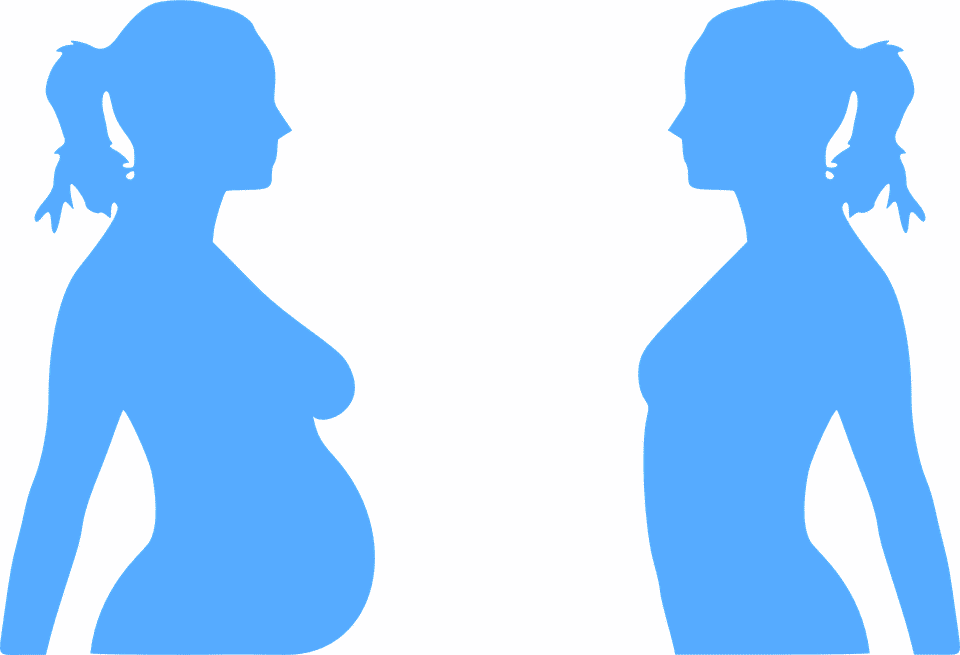To better understand the changes due to pregnancy, please consult the first part of the entry, Pregnancy Symptoms.
Pregnancy symptoms are felt around the body. In this entry we will look at the upper body.
Nausea and headaches are frequent at the start of pregnancy.
The significant increase in hormones (including prostaglandin) often leads to these symptoms. Vitamin B6 deficiency, infection, increased sensitivity to smell, psychological and genetic factors may also affect the onset and intensity of these symptoms. For most women, everything will stabilise at the end of the first trimester. Occasional headaches can continue but you will note that if you have severe migraines, the doctor will examine your condition and help you deal with them. In the general population, including pregnant women, tension cephalalgia (headaches) are what we find most often (30–78%). These headaches can last between 30 minutes and 7 days. Women also feel pain, a tightening of a band around their head. The intensity can vary over time from light to moderate. For migraines, pregnant women will have improved symptoms in 60–70% of cases, and breastfeeding seems to soothe as well.
Nausea will occur in more than 50% of future mothers, but there isn’t always vomiting. This symptom is severe in 1 in 200 women.
Do you have nosebleeds? This symptom is directly associated with an increase in blood volume and the dilation of vessels in the body. You have never had so much blood in your body, and your vessels are bursting! Blowing your nose or brushing your teeth can make small thin capillaries inside the nose or gums bleed, called pregnancy gingivitis.
For your face and jaw, we often note the appearance of brown spots on the skin, which are called a pregnancy mask. The increase in metabolism brings more pigmentation from melanin and an activation of cells which pigment the skin. This is sensitive to hormonal changes causing colouration increased by exposure to the sun. This phenomenon deepens freckles and even darkens the areola and nipples. 85–90% of pregnant women note this effect. This discolouration is mostly found on the face (more so when exposed to the sun), arms, hands and thorax.
Thorax
Many pregnant women note heartburn. The burning sensation is due to gastric reflux in the esophagus, not a problem with the stomach. It’s very uncomfortable and may or may not occur during pregnancy.
Pregnancy causes different vulnerabilities for each person. Normally, those with reflux at the start of pregnancy have had this problem before. Gastroesophageal reflux is diagnosed in 30 to 50% of pregnant women at one time or another of pregnancy.
The hormone that relaxes the muscle at the entry to the stomach allows the contents to move up the esophagus and provokes a burning feeling for the future mother. Hormonal changes and the slowing of gastrointestinal transit are often the cause of the reflux.
Given the cardiac load increases, the heart will beat faster, sometimes leading to palpitations. Irregular heartbeat can be observed during pregnancy, which is normally temporary if it’s associated with gestation. Heartbeat will increase between 10 and 20%. This function will adjust over the weeks of pregnancy and with the increase in liquids in the system. Generally speaking, there will be an increase in heartbeat, an increase in blood flow and an increase in the contractility of the heart muscle.
More liquids, more blood throughout the pregnancy, more retention and more circulation and exchange towards the lungs explains frequent shortness of breath in many mothers, and this, even without physical activity. Climbing stairs, bending over, walking short distances, all this can lead to periodic shortness of breath throughout pregnancy. There is an increase of 20–30% in the consumption of oxygen and a normal increase in respiratory functions as a consequence.
One pregnancy hormone, progesterone, also relaxes certain tissues and blood vessels which leads to dilation (relaxing of vein and capillary walls). This will lead to a lowering of blood pressure and often drops in pressure in certain pregnant women (vasovagal response). They will feel hot flashes, dizziness, and a feeling of almost passing out. This dilation of outer blood vessels will lead to varicose veins and hemorrhoids, even if the pregnant woman isn’t constipated.
Breasts can gradually increase in size with the weeks of pregnancy in preparation for breastfeeding. If your breasts don’t change, talk to your doctor. They may examine them, especially if you want to breastfeed. At the start of pregnancy, breasts can be heavier and very sensitive. Normally, this will stabilise around the end of the first trimester when hormones reduce in quantity.
Breast pain can sometimes feel like when a woman is about to get her period.
To learn more about changes in the abdomen, read the next entry – Abdomen.



